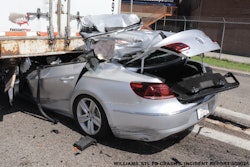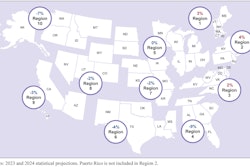Recently, NACFE’s team of Mike Roeth, executive director, and Denise Rondini, communications director, surpassed 500 blogs published in a trucking trade journal. I feel a little like Crash Davis in Bull Durham as my tally is barely more than 100 for CCJ.
When I began working with NACFE more than a decade ago, I never imagined I would be writing nearly weekly thought leadership pieces for CCJ, or that people would actually be reading them. In my heart I feel it’s a bit arrogant to assume they are thought leadership pieces. Perhaps let’s just call them opinion pieces.
My hat is off to all the professional journalists who have to produce copy on a daily basis, and have to try to be innovative and insightful all the time. It’s tough to come up with something new and insightful frequently. I suffer from the occasional writer’s block and the endless fear of producing irrelevant non-value added noise to the industry.
Years ago, I saw a documentary about George Carlin’s life. There was a point in time where one of his contemporaries was concerned that his material had gotten stale, had lost its edginess, as he did a piece on peas. I also recall a more recent trucking industry event where the keynote speaker talked about “Jumping the Shark,” the story around the time the Happy Days television crew took their iconic Fonzie character toward the end of the series.
Staying relevant and interesting is tough.
At times, I struggle writing and trying to keep trucking technology in perspective with respect to everything else. As a member of a non-profit group focused on providing an unbiased view of freight efficiency technologies, there are a lot of topic areas I don’t stray into.
You are reading this, possibly on your smart phone, having a cup of coffee over your breakfast, because you care about trucking. That relatively safe cocoon of your breakfast table is not available to everyone in the world.
The real world is full of a seemingly endless parade of man’s inhumanity to man, poverty, disease, and even simpler things like not having running water or electricity.
I participated in a major industry event in Tacoma, Wash., last year, talking about hydrogen and battery electric trucks. One of the panels discussed the challenges of advocating for electric vehicles in our country where some people don’t yet have electricity.
One estimate I found is that approximately 60,000 people in the U.S. do not have electricity. More than 2 million people in the U.S. do not have easy access to clean water. Talking about the future of trucking is important, but sometimes it can feel like putting the cart before the horse.
Yes, breathing clean air is important to everyone. I rationalize that progress is a journey not a destination, and improving trucking efficiency has the parallel benefit of improving air quality. It’s one piece of a very big puzzle on how to make all our lives better.
I often wonder about people in the less densely populated parts of the U.S., Canada and Mexico; like Kansas, Wyoming, Nevada, Alaska, Canada’s north, and Mexico’s rural areas where nearly 20% of their population lives. How can technology solutions focused on improving the majority also benefit the minority; the rural areas? Driving through parts of the U.S. in Texas, New Mexico, Arizona, Nevada, eastern Oregon and Washington has convinced me that there is a lot of empty space in America. People also live in those empty spaces where there are no fuel pipelines, no high voltage powerlines, no reservoirs with water, and no dams providing electricity.
How will the evolving trucking technologies address those areas? I’ve been places where the roads don’t have edges, as sand continually blows over them obscuring the striping. How will autonomous vehicles deal with the multitude of real-world edge cases in those rural areas?
There are still locations where cell phone coverage is not guaranteed. Solutions like Starlink satellites are theoretically great, but if you are living hand-to-mouth somewhere, how will you be able to pay for them?
Our world has some major challenges. Improving trucking is just one of them.
Trucking technologies are important. Improving transportation has contributed extensively to raising standards of living and improving quality of life. Think where we would be if we were still relying on horse drawn wagons to transport goods.
Yet all that progress in trucking needs to be put in perspective with everything else. We can’t lose ourselves in the relative safety of trucking technology while the rest of the world’s issues are occurring.
I write about trucking technology because it is my passion, my career, my experience, my role and because I care about it. However, I do know there is more out there to care about. Trade journals are focused on specific topics, appealing to specific interests. They are very value added. But there is more out there. Trucking people are not one dimensional.
When you read the trade journals and trucking social media, just don’t assume that the technology is all trucking people care about.











